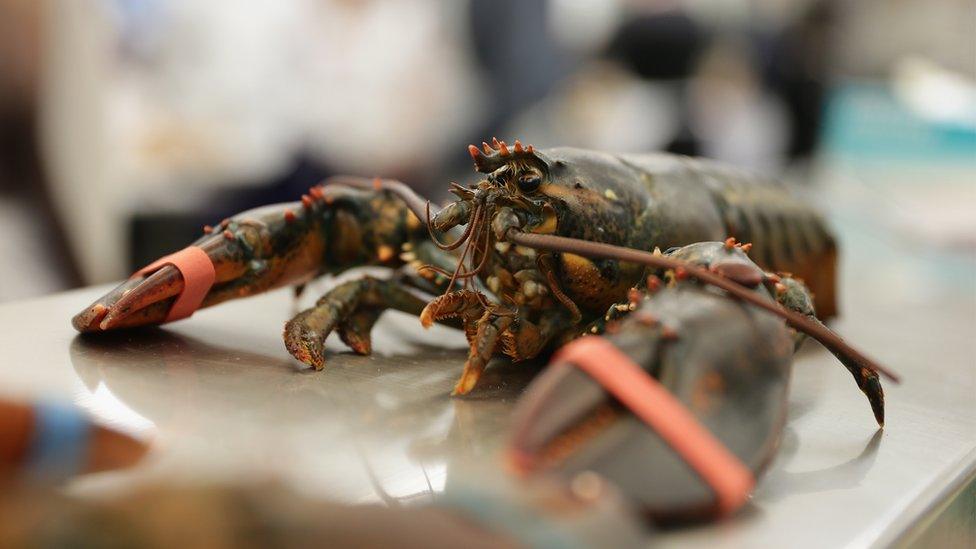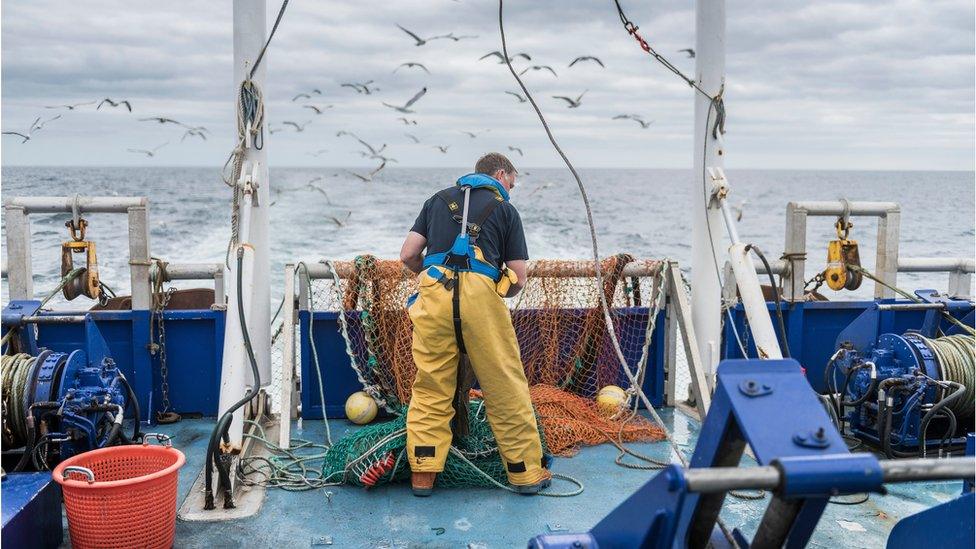New Scottish-caught seafood added to 'fish-to-avoid' list
- Published

A range of seafood caught off the Scottish coast has been added to a "fish-to-avoid" list compiled by conservationists.
They include monkfish from the North Sea and west of Scotland as well as some species of skates and rays.
Some sources of crab and lobster are also among 14 seafood options joining those with a red rating from the Marine Conservation Society (MCS).
The charity's latest assessment of UK seafood appears in its Good Fish Guide.
It informs shoppers and diners of which fish sources are sustainable using a traffic light system.
Green is the best choice, amber is acceptable to eat but improvements are needed, and red indicates fish to avoid.
The latest guide assesses 656 options for species and areas where they are caught, with 148 now on the best choice list and 161 red-rated as seafood to avoid.
Poor management
Fish and seafood are red-rated when they are assessed as being overfished, poorly managed and under pressure, or because of environmental damage caused by fishing or accidentally catching wildlife - known as bycatch.
The latest guide includes new ratings for Scottish brown crab and lobster, with eight of the nine new ratings either amber or red listings, and Shetland brown crab getting the only green-rated option in the UK.
The ratings are due to concerns over populations suffering because of poor management and, in some areas, the entanglement of whales in the ropes attached to the pots the seafood is caught in.
Monkfish from the North Sea and west of Scotland moves onto the fish-to-avoid list as numbers have declined from a peak in 2017 to the lowest since 2013, with conservationists warning management is poor and fishing pressure too high.
And most Good Fish Guide ratings for skates and rays put them on the fish-to-avoid list, with currently no green-rated options and few listed as amber.

Charlotte Coombes, Good Fish Guide manager, told BBC Radio's Good Morning Scotland that monkfish had gone down 30% in the North Sea and west of Scotland over the last couple of years.
And she described the available information for crab and lobster in the west of Scotland as "very worrying".
Asked about the significance of a red list entry, she said: "What it does is it drives them up the agenda for really looking at how we can do more to protect these species.
"So, the real challenge with crab and lobster is that there is almost no real management in place right now to protect them.
"There are no catch limits and there are no limits on how many pots can be put out for them and that means there is nothing to prevent them being over-fished."
Ms Coombes added good examples of sustainable fish include North Sea herring, North Sea haddock and mackerel.
She also told the programme there were some good farmed shellfish options.
Healthy marine environment
Ms Coombes said: "The key thing is always to check what species you are buying, where it was caught or farmed and how and to use the Good Fish Guide so you can find out how sustainable it is."
Elsewhere, there is better news for North Sea herring which returns to the best choice, with better numbers of stock than previously thought, and Southern Celtic Seas and English Channel sardines also moving up to a green rating.
Mackerel stays green-rated, scampi and langoustine are an amber choice if trawled but best choice if pot-caught.
There are mixed ratings for Celtic Sea haddock, cod and whiting, with warnings that the populations of cod and whiting caught there are at dangerously low levels.
Clara Johnston, fisheries policy manager at the Marine Conservation Society, said: "The latest Good Fish Guide ratings, where all new UK ratings are either amber or red rated, illustrate the urgent need for transparency and better management if we're to recover fish stocks in UK seas."
A UK government spokesman said: "The joint fisheries statement sets our approach for achieving a resilient fishing industry and healthy marine environment.
"We are consulting on its contents and welcome views from the fishing industry and environmental groups to ensure our waters are better protected and fished sustainably."